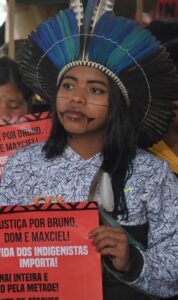Table of Contents
Build counterpower
 Our efforts to build counterpower focused on the defence and promotion of the freedom of peaceful assembly (FoPA), an internationally recognised fundamental human right that is currently under threat.
Our efforts to build counterpower focused on the defence and promotion of the freedom of peaceful assembly (FoPA), an internationally recognised fundamental human right that is currently under threat.
Together with members and partners, we co-designed WeRise!, a campaign focused on the right to protest at the local and grassroots level, as a complement to our FoPA Global Resource Hub, which is more regional and international in scope. A meeting in Tanzania in August 2023 kicked off a year-long process of designing and testing strategies to strengthen and sustain local protest movements. At another meeting in Kenya in June 2024, participants shared success stories and lessons learned from 16 campaigns in 11 countries across four regions. Successful experiences included the organisation of several peaceful protests in Togo, one of which attracted more than 4,000 people, Salam for Democracy and Human Rights’ use of social media and film to change attitudes about the right to protest in Bahrain, Colmenas’ work with working class Mexican women to highlight their struggles and challenges in exercising their right to peaceful protest and the creation of the first digital library on FoPA in the Middle East and North Africa region by the Lebanese organisation HuMENA.
We sought to develop strong connections and collaboration between Global Resource Hub partners, We Rise! participants and regional activists. In March 2024, we brought them all together at the Global Resource Hub Annual Partners Meeting.
In collaboration with Dutch Embassies, CIVICUS held Defenders and Diplomats Dialogues across regions. In Malawi, Mozambique and Zambia, engagements focused on deepening understanding and engagement on key policy issues in southern Africa. In Latin America, we held dialogues with HRDs in Costa Rica, Nicaragua and Peru, contributing to strengthening the transnational advocacy of activists and HRDs in exile.
Defending the freedom of peaceful assembly at the UN
At the UN, through our engagement with the HRC and the Special Rapporteur on FoAA, we highlighted violations and made recommendations. We reported that three of the top 10 violations of civic freedoms documented by the CIVICUS Monitor in 2023 involved restrictions on peaceful protests and condemned alarming patterns of excessive use of force by law enforcement bodies and arbitrary detention of peaceful protesters on trumped-up charges.
We delivered over 10 statements at the HRC highlighting FoPA restrictions and brought these to the attention of the HRC through our UPR submissions. We also engaged with the HRC by providing input on its Resolution on peaceful protest, particularly on language related to compliance with international standards on the use of force and the need to align domestic laws and practices with the HRC’s General Comment 37 and adopt best practices on FoPA.
In 2023, we contributed through a submission to the thematic report of the Special Rapporteur on FoAA on accountability for serious human rights violations related to the right to protest and supported a side event for the launch of the report. We also consulted with the new Special Rapporteur on FoAA to support the mandate’s priority-setting process.
We contributed data to the report that the Special Rapporteur on FoAA presented to the HRC in June and supported the participation of regional activists, two of whom had one-on-one meetings with the outgoing and incoming UN Special Rapporteurs on FoAA.
Building counterpower also means defending the right to defend rights. That’s why we redoubled the efforts of our #StandAsMyWitness campaign to demand the freedom of people unjustly imprisoned for exercising their rights. Our campaign helped secure the release of former Guatemalan anti-corruption prosecutor Virginia Laparra in January 2024.
Our report on youth activism, the result of a participatory research project led by the Youth Action Team (YAT), was presented in various forums and became a key part of our engagement with the UN Special Rapporteur on human rights defenders, Mary Lawlor, who cited it extensively in her report on the challenges faced by child and youth human rights defenders.
As part of an inaugural meeting for our new multi-year programme to strengthen member-led networks, representatives of key CIVICUS networks met in Latvia to plan strategically for the future. In parallel, the Vuka! Coalition Steering Group met to review and update its strategy.
We are also working with members and partners affected by the attacks on civilians in Israel and the Occupied Palestinian Territories to support actions and responses for peace. Over 60 CIVICUS members, including several directly affected groups, participated in our open session on developing a response, held via the CIVICUS online community. The discussion reinforced our calls for greater accountability from UN member states and for community members, particularly women, to be at the centre of negotiations and decision-making processes. As an outcome of the open conversations held with members, a collaboration emerged with the Resilient Pathways initiative. CIVICUS has played a role in curating and facilitating a space for donor education led by Palestinian civil society.